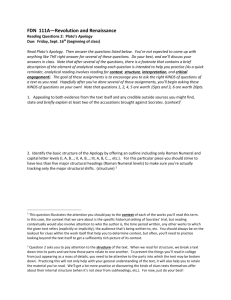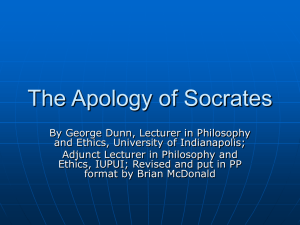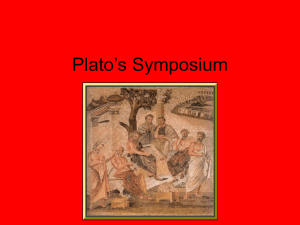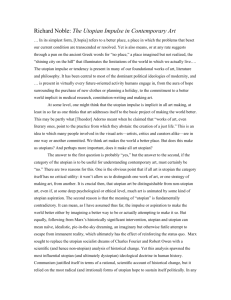Works Cited - University of Richmond Blogs
advertisement
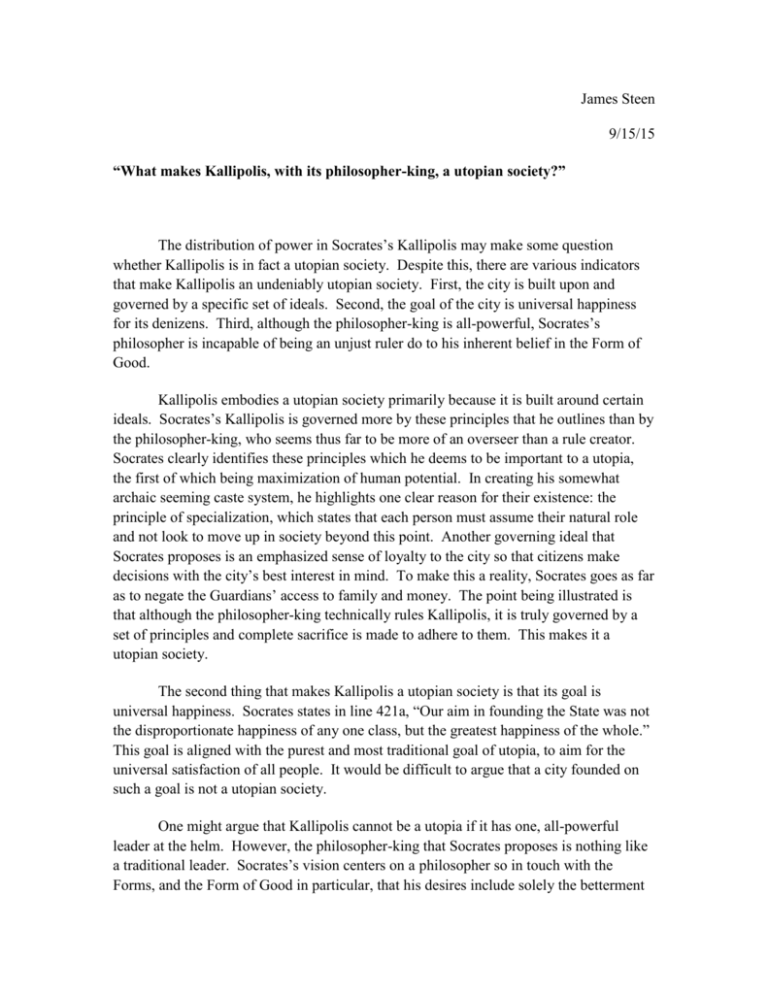
James Steen 9/15/15 “What makes Kallipolis, with its philosopher-king, a utopian society?” The distribution of power in Socrates’s Kallipolis may make some question whether Kallipolis is in fact a utopian society. Despite this, there are various indicators that make Kallipolis an undeniably utopian society. First, the city is built upon and governed by a specific set of ideals. Second, the goal of the city is universal happiness for its denizens. Third, although the philosopher-king is all-powerful, Socrates’s philosopher is incapable of being an unjust ruler do to his inherent belief in the Form of Good. Kallipolis embodies a utopian society primarily because it is built around certain ideals. Socrates’s Kallipolis is governed more by these principles that he outlines than by the philosopher-king, who seems thus far to be more of an overseer than a rule creator. Socrates clearly identifies these principles which he deems to be important to a utopia, the first of which being maximization of human potential. In creating his somewhat archaic seeming caste system, he highlights one clear reason for their existence: the principle of specialization, which states that each person must assume their natural role and not look to move up in society beyond this point. Another governing ideal that Socrates proposes is an emphasized sense of loyalty to the city so that citizens make decisions with the city’s best interest in mind. To make this a reality, Socrates goes as far as to negate the Guardians’ access to family and money. The point being illustrated is that although the philosopher-king technically rules Kallipolis, it is truly governed by a set of principles and complete sacrifice is made to adhere to them. This makes it a utopian society. The second thing that makes Kallipolis a utopian society is that its goal is universal happiness. Socrates states in line 421a, “Our aim in founding the State was not the disproportionate happiness of any one class, but the greatest happiness of the whole.” This goal is aligned with the purest and most traditional goal of utopia, to aim for the universal satisfaction of all people. It would be difficult to argue that a city founded on such a goal is not a utopian society. One might argue that Kallipolis cannot be a utopia if it has one, all-powerful leader at the helm. However, the philosopher-king that Socrates proposes is nothing like a traditional leader. Socrates’s vision centers on a philosopher so in touch with the Forms, and the Form of Good in particular, that his desires include solely the betterment of the city. Socrates spends the majority of Book VI defending the virtuosity of philosophers and attempting to prove the morality of their nature. In Book VI, line 494a, Socrates surmises, “there shall arise philosopher-kings, one or more, who will despise earthly vanities, and will be the servants of justice only.” The existence of the philosopher-king is only to oversee the cultivation of the city’s principles, such as eliminating poverty and distributing resources fairly. Thus, Kallipolis is a utopia and the philosopher-kings exist only to oversee its success, not to rule unchecked. “I pledge that I have neither received nor given any unauthorized assistance during the completion of this work. James David Steen.” Works Cited Plato, ., Grube, G. M. A., & Reeve, C. D. C. (1992). Republic. Indianapolis: Hackett Pub. Co.

